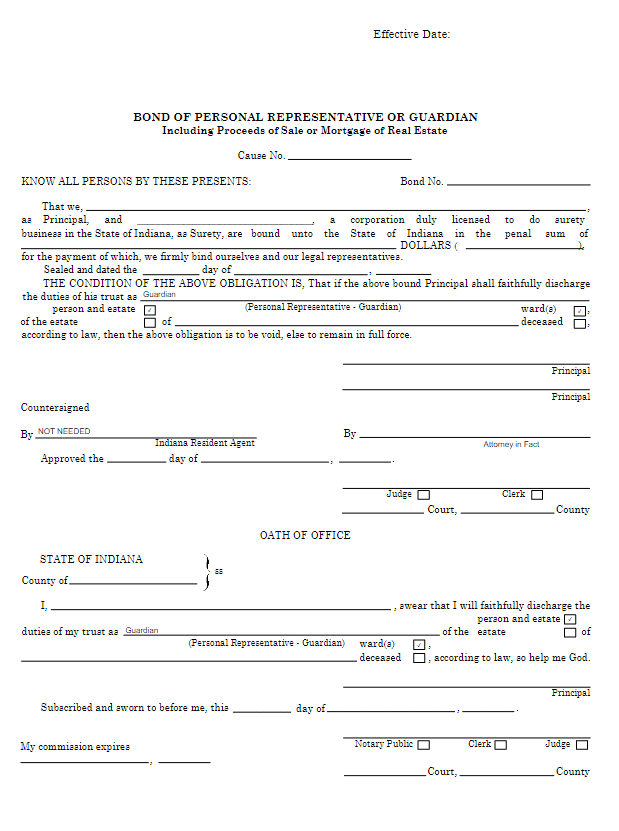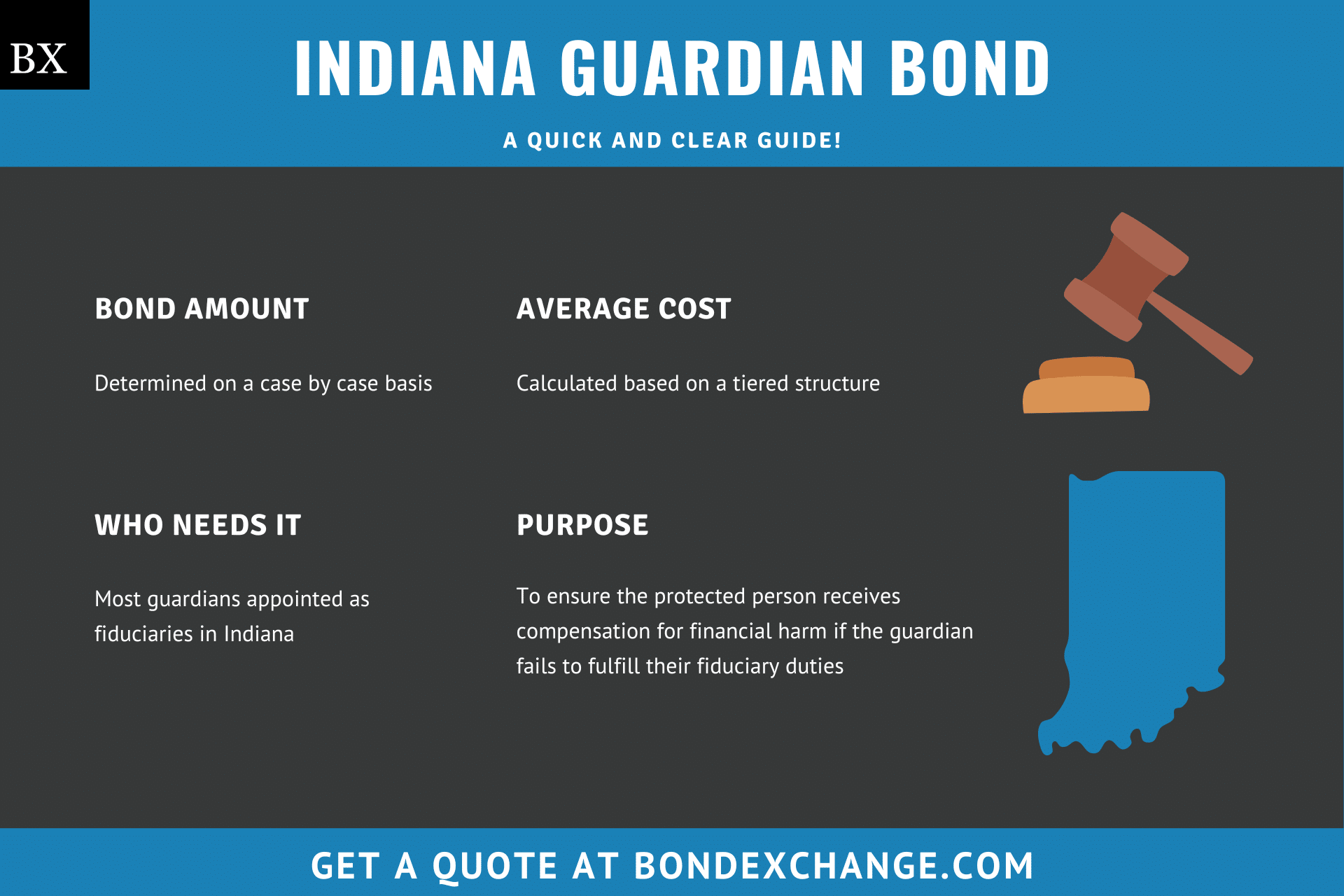Indiana Guardian Bond: A Comprehensive Guide
This guide provides information for insurance agents to help their customers obtain an Indiana Guardian bond.
At a Glance:
- Average Cost: Calculated based on a tiered structure
- Bond Amount: Determined on a case-by-case basis (more on this later)
- Who Needs It: Most guardians appointed as fiduciaries in Indiana
- Purpose: To ensure the protected person receives compensation for financial harm if the guardian fails to fulfill their fiduciary duties
- Who Regulates Guardian Bonds in Indiana: The trial court with jurisdiction over where the protected person resides or has property

Background
Indiana Code 29-3-5-3 requires all guardians to be appointed by a court and swear an oath before assuming their fiduciary duties. The Indiana legislature enacted the appointment requirement to ensure guardians act in the protected person’s best interests when making decisions related to their welfare or managing their estate. To provide financial security for the enforcement of this requirement, most guardians must purchase and maintain a probate surety bond before becoming appointed as a fiduciary.
In Indiana, the court handling the guardianship case will vary county by county. In certain counties such as Hamilton or Marion, guardianship cases are handled by the superior court while other counties handle guardianship cases in circuit court. St. Joseph’s County is the only county in Indiana that has a Probate Court which handles probate cases exclusively. Visit the Indiana Judicial Branch’s website for more information on the specific procedures for guardianship cases in your county.
What is the Purpose of the Indiana Guardian Bond?
Indiana requires most guardians to purchase a surety bond as a prerequisite to being appointed as a fiduciary over a protected person. The bond ensures that the estate will receive compensation for financial harm if the guardian fails to abide by the regulations outlined in Indiana Code 29-3-7-1 et seq. Specifically, the bond protects the estate if the guardian fails to adhere to all court orders or mismanages the estate’s assets.
For example, if a guardian uses money from a minor’s bank account to pay for unauthorized expenses or mixes the estate’s funds with their own, the minor can file a claim against the guardian’s bond to recoup their losses. In short, the bond is a type of insurance in favor of the protected person if the guardian does not fulfill their fiduciary duties.
How Can an Insurance Agent Obtain an Indiana Guardian Bond?
BondExchange makes obtaining an Indiana Guardian bond easy. Simply log-in to your account and use our keyword search to find the “Guardian” bond in our database. Don’t have a login? Gain access now and let us help you satisfy your customers’ needs. Our friendly underwriting staff is available by phone (800) 438-1162, email or chat from 7:30 AM to 7:00 PM EST to assist you.
At BondExchange, our 40 years of experience, leading technology, and access to markets ensures that we have the knowledge and resources to provide your clients with fast and friendly service whether obtaining quotes or issuing bonds.
Not an agent? Then let us pair you with one!

Click the above image to find a BX Agent near you
How is the Bond Amount Determined?
Indiana Code 29-3-7-1 dictates that the bond amount must equal the aggregate value of the property under the guardian’s control plus the estimated income to be generated by the estate over the next year.
The bond amount may be reduced by the value of any assets deposited that cannot be withdrawn or sold without a court order. Conservators that do not wish to purchase a bond may request to submit another form of collateral instead, such as a pledge of securities or a mortgage of land.
What are the Underwriting Requirements for the Indiana Guardian Bond?
Most surety companies will examine the following factors when determining eligibility for the Indiana Guardian bond:
- Guardian’s credit history
- Whether or not the estate has an attorney
- Whether or not the guardian is a family member
- The guardian’s occupation
- Whether or not the guardian is replacing a prior fiduciary
- If the guardian has ever committed a felony
- Whether or not there is any ongoing business in the estate
- If a creditor is requiring the bond
- If the bond amount is greater than or equal to the estate’s value
How Much Does the Indiana Guardian Bond Cost?
Surety companies typically determine the premium rate for Guardian bonds based on a tiered structure, so larger bond amounts will be charged a lower premium rate than smaller bonds.
The following table illustrates the pricing structure for the Indiana Guardian bond:
$1,500,000 Guardian Bond Cost
| Bond Amount | Premium Rate | Total Bond Cost |
|---|---|---|
| First $20,000 | 0.75% | $150 |
| Next $40,000 | 0.60% | $240 |
| Next $140,000 | 0.50% | $700 |
| Next $300,000 | 0.375% | $1,125 |
| Next $1,000,000 | 0.25% | $2,500 |
| Total cost of $4,715 |
Who is Required to Purchase the Bond?
Indiana requires most guardians to purchase a surety bond as a prerequisite to becoming a court-appointed fiduciary. To paraphrase Indiana Code 29-3-1-1 et seq, a “guardian” is a person who is appointed as a fiduciary to take care of and make decisions for a minor or incapacitated adult. Likewise, a “protected person” is a minor or incapacitated adult for whom a guardian has been appointed. Additionally, a “minor” is a person under the age of 18, and an “incapacitated adult” is an adult who has been judged by a court to be legally unable to manage their property or take care of themselves.
Guardians are not required to purchase a surety bond if the court determines one is unnecessary for the protection of the estate or if the appointed guardian is a bank or trust company defined in Indiana Code 28-1-1-3.

How do Indiana Guardians Become Appointed as Fiduciaries?
Guardians in Indiana must navigate several steps to become appointed as fiduciaries. Below are the general guidelines for guardianships over a person’s property, but appointees should refer to the appointment statutes or the Indiana Judicial Branch’s website for details on the process.
Step 1 – Hire an Attorney
Although not explicitly required, it is highly recommended that guardians hire an attorney to assist with the guardianship process.
Step 2 – Determine Priority
Priority to serve as a guardian is granted in the following order:
-
- An individual or corporation nominated in a durable power of attorney
- A person currently designated as a standby guardian of the protected person
- The spouse of the protected person
- The adult child of the protected person
- A parent of the protected person, or their nominee
- A relative of the protected person who has resided with the person for at least 6 months before the petition is filed
- A person or corporation nominated by the protected person who is caring for or paying benefits to the individual
The court will appoint the guardian best suited for the protected person and may choose to appoint a person with lower priority or without priority.
Step 3 – File a Petition for Appointment
Persons seeking guardianship over a minor or incapacitated adult must file a petition for appointment with the trial court with jurisdiction over where the minor/adult resides or owns property. Petitioners can obtain the necessary forms from the court and must also pay a filing fee to begin the guardianship case.
Petitioners seeking appointment as a guardian of a minor must complete a criminal history check with the Department of Child Services to determine eligibility to serve as a guardian. If the person to be protected is incapacitated by health conditions, petitioners should also submit a physician’s report verifying that he or she is incapable of managing their self-care or finances.
Step 4 – Notify the Appropriate Parties
After submitting the required items to the court, petitioners must notify the protected person, all close family members, and any person with care and custody of the protected person within the previous 60 days before filing the petition. The petitioners may have to notify additional parties as the court may direct. Each person to be served must receive a notice with the time and location of the hearing along with a copy of the petition.
Step 5 – Attend a Hearing
Guardians must attend a hearing conducted by the court and present evidence as to why the minor or incapacitated adult is in need of guardianship. The court will examine the evidence presented by the guardian as well as that presented by the person being evaluated (if any) and make a determination as to whether or not guardianship is necessary.
Any interested person can apply to the court to participate in the hearing. If the court finds a basis for the appointment, it will issue a letter of guardianship to the petitioner.
Step 6 – Purchase a Surety Bond
Unless otherwise exempt, guardians must purchase and maintain a surety bond (limits outlined above).
How do Indiana Guardians File Their Bonds?
Guardians should file their oath of office and completed bond forms, including the power of attorney, to the clerk of the trial court with jurisdiction over where the protected person resides or has property.
The surety bond requires signatures from the surety company that issues the bond, the applicant, and the court clerk or judge presiding over the case. The surety company should include the following information on the bond form:
- Legal name and address of the entity/individual(s) buying the bond
- Legal name and county of the protected person
- Surety company’s name
- Bond amount
- Name of the court handling the guardianship case
- Date the bond is signed and goes into effect
What can Indiana Guardians do to Avoid Claims Made Against Their Bonds?
To avoid claims against their bonds, guardians in Indiana must ensure that they:
- Perform all of their fiduciary duties
- Obey all court orders
- Do not mismanage the protected person’s property
- Obtain court approval before using any of the estate’s funds
